Management and Operations Report: Leadership, Management, Nestle
VerifiedAdded on 2023/01/12
|11
|3235
|70
Report
AI Summary
This report provides a comprehensive analysis of leadership, management, and operational strategies, using Nestle Corporation as a case study. It defines the roles and characteristics of leaders and managers, examining their functions in various business situations, such as technological advancements and high labor turnover. The report explores different leadership theories and models, including situational, contingency, and systems theory, offering insights into their application within Nestle. It also details operational management approaches like Just-In-Time (JIT) and Six Sigma, highlighting their importance and value. Furthermore, the report assesses factors within the business environment, providing a holistic view of effective management practices. The analysis includes practical examples and real-world scenarios, making it a valuable resource for understanding management and operations.
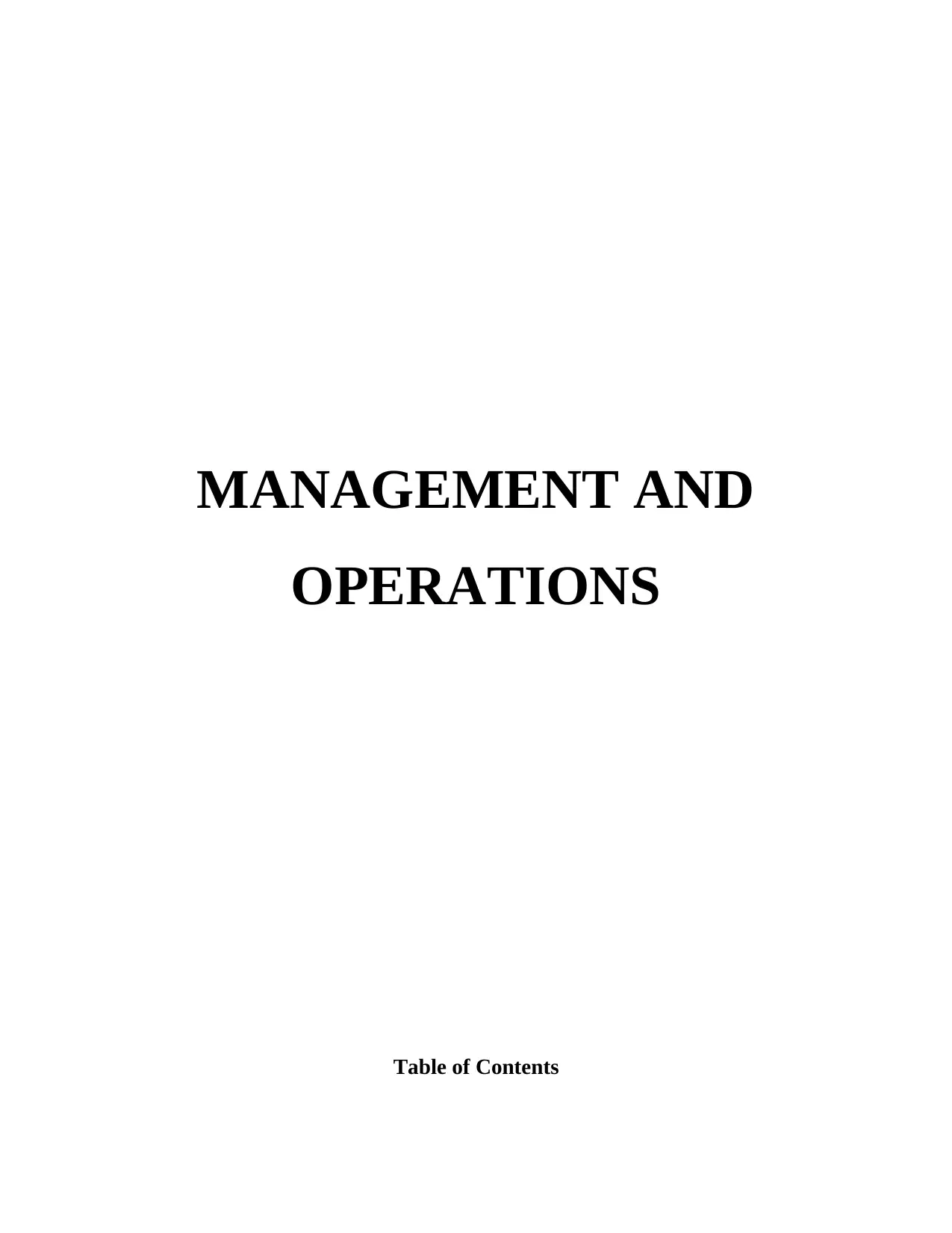
MANAGEMENT AND
OPERATIONS
Table of Contents
OPERATIONS
Table of Contents
Paraphrase This Document
Need a fresh take? Get an instant paraphrase of this document with our AI Paraphraser
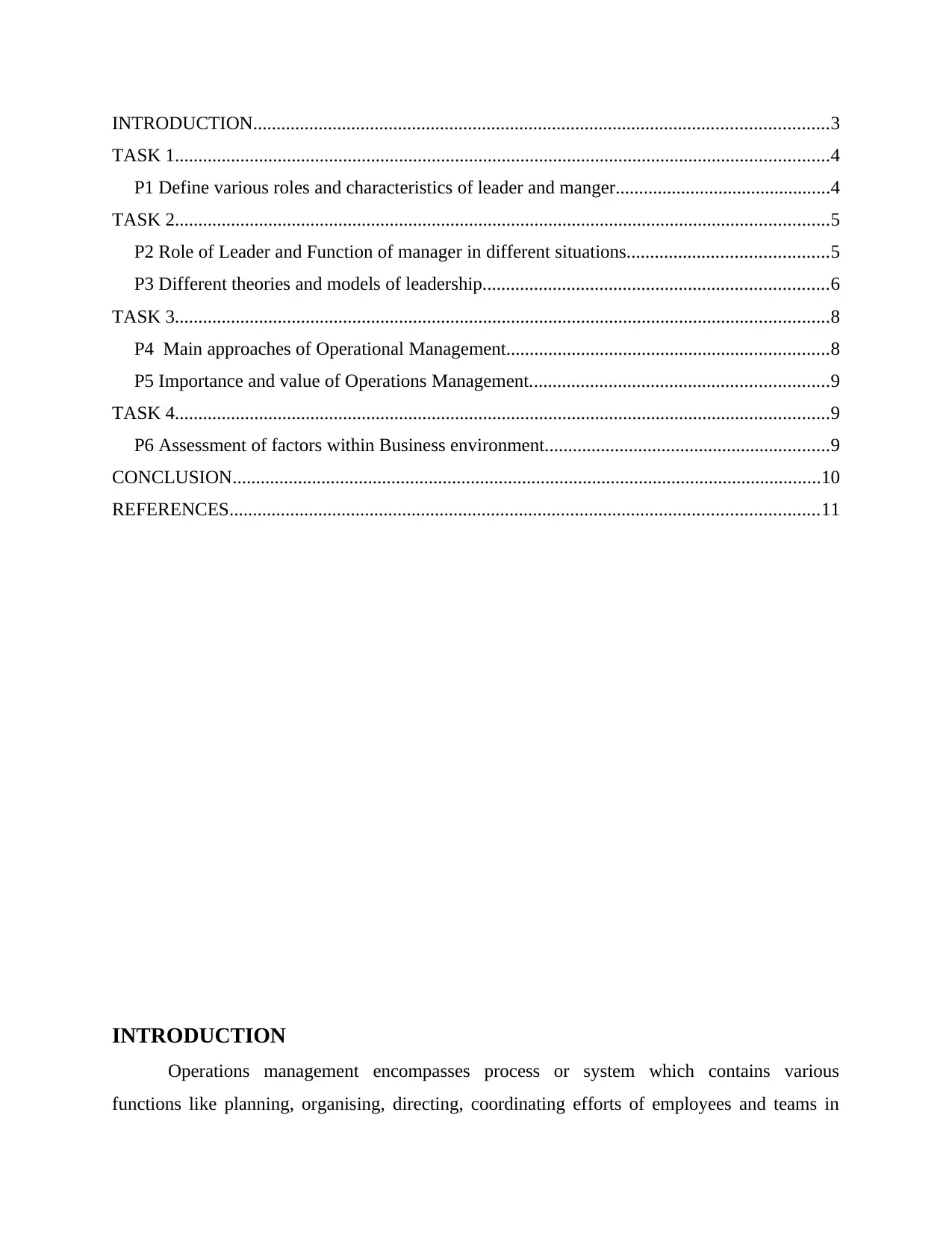
INTRODUCTION...........................................................................................................................3
TASK 1............................................................................................................................................4
P1 Define various roles and characteristics of leader and manger..............................................4
TASK 2............................................................................................................................................5
P2 Role of Leader and Function of manager in different situations...........................................5
P3 Different theories and models of leadership..........................................................................6
TASK 3............................................................................................................................................8
P4 Main approaches of Operational Management.....................................................................8
P5 Importance and value of Operations Management................................................................9
TASK 4............................................................................................................................................9
P6 Assessment of factors within Business environment.............................................................9
CONCLUSION..............................................................................................................................10
REFERENCES..............................................................................................................................11
INTRODUCTION
Operations management encompasses process or system which contains various
functions like planning, organising, directing, coordinating efforts of employees and teams in
TASK 1............................................................................................................................................4
P1 Define various roles and characteristics of leader and manger..............................................4
TASK 2............................................................................................................................................5
P2 Role of Leader and Function of manager in different situations...........................................5
P3 Different theories and models of leadership..........................................................................6
TASK 3............................................................................................................................................8
P4 Main approaches of Operational Management.....................................................................8
P5 Importance and value of Operations Management................................................................9
TASK 4............................................................................................................................................9
P6 Assessment of factors within Business environment.............................................................9
CONCLUSION..............................................................................................................................10
REFERENCES..............................................................................................................................11
INTRODUCTION
Operations management encompasses process or system which contains various
functions like planning, organising, directing, coordinating efforts of employees and teams in
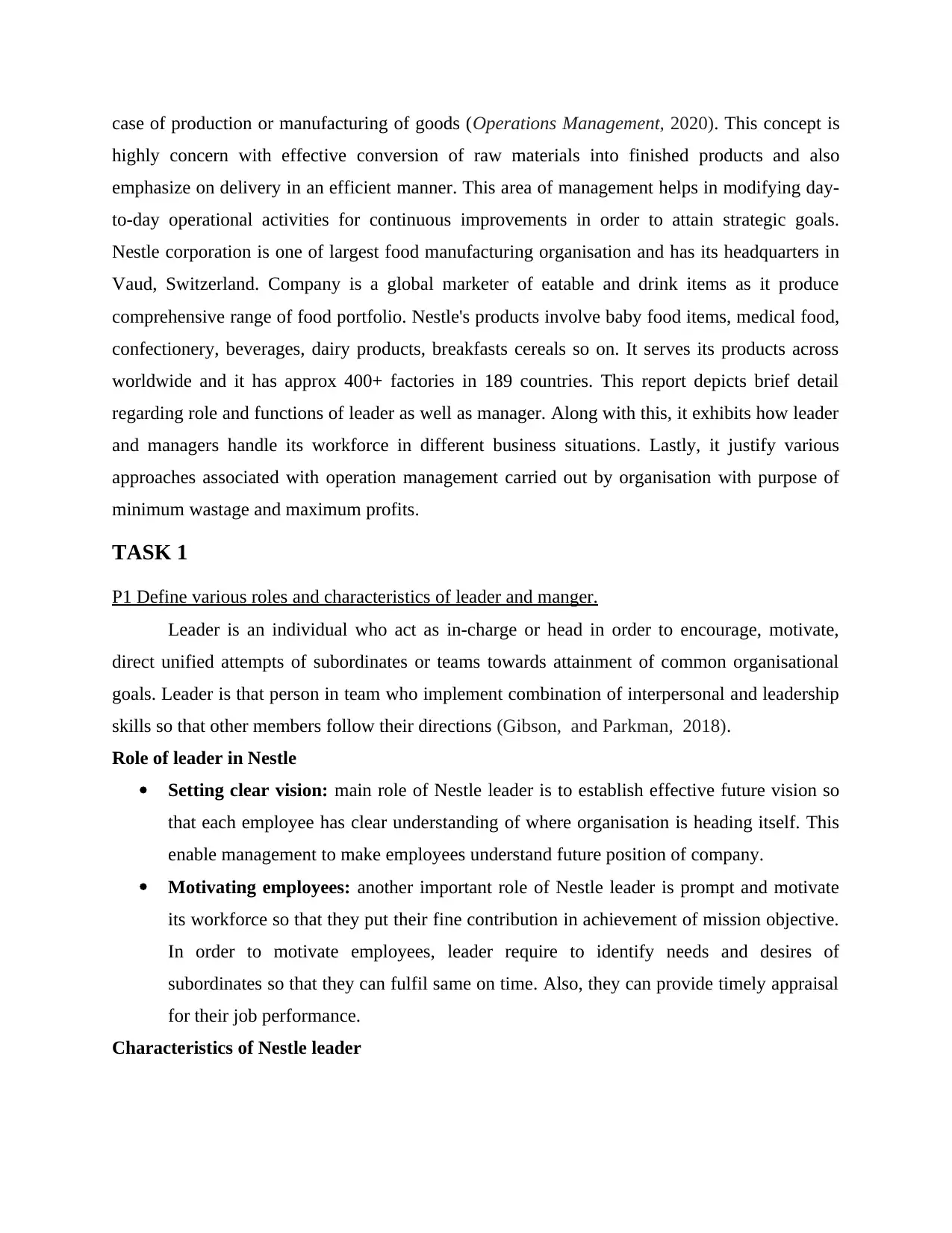
case of production or manufacturing of goods (Operations Management, 2020). This concept is
highly concern with effective conversion of raw materials into finished products and also
emphasize on delivery in an efficient manner. This area of management helps in modifying day-
to-day operational activities for continuous improvements in order to attain strategic goals.
Nestle corporation is one of largest food manufacturing organisation and has its headquarters in
Vaud, Switzerland. Company is a global marketer of eatable and drink items as it produce
comprehensive range of food portfolio. Nestle's products involve baby food items, medical food,
confectionery, beverages, dairy products, breakfasts cereals so on. It serves its products across
worldwide and it has approx 400+ factories in 189 countries. This report depicts brief detail
regarding role and functions of leader as well as manager. Along with this, it exhibits how leader
and managers handle its workforce in different business situations. Lastly, it justify various
approaches associated with operation management carried out by organisation with purpose of
minimum wastage and maximum profits.
TASK 1
P1 Define various roles and characteristics of leader and manger.
Leader is an individual who act as in-charge or head in order to encourage, motivate,
direct unified attempts of subordinates or teams towards attainment of common organisational
goals. Leader is that person in team who implement combination of interpersonal and leadership
skills so that other members follow their directions (Gibson, and Parkman, 2018).
Role of leader in Nestle
Setting clear vision: main role of Nestle leader is to establish effective future vision so
that each employee has clear understanding of where organisation is heading itself. This
enable management to make employees understand future position of company.
Motivating employees: another important role of Nestle leader is prompt and motivate
its workforce so that they put their fine contribution in achievement of mission objective.
In order to motivate employees, leader require to identify needs and desires of
subordinates so that they can fulfil same on time. Also, they can provide timely appraisal
for their job performance.
Characteristics of Nestle leader
highly concern with effective conversion of raw materials into finished products and also
emphasize on delivery in an efficient manner. This area of management helps in modifying day-
to-day operational activities for continuous improvements in order to attain strategic goals.
Nestle corporation is one of largest food manufacturing organisation and has its headquarters in
Vaud, Switzerland. Company is a global marketer of eatable and drink items as it produce
comprehensive range of food portfolio. Nestle's products involve baby food items, medical food,
confectionery, beverages, dairy products, breakfasts cereals so on. It serves its products across
worldwide and it has approx 400+ factories in 189 countries. This report depicts brief detail
regarding role and functions of leader as well as manager. Along with this, it exhibits how leader
and managers handle its workforce in different business situations. Lastly, it justify various
approaches associated with operation management carried out by organisation with purpose of
minimum wastage and maximum profits.
TASK 1
P1 Define various roles and characteristics of leader and manger.
Leader is an individual who act as in-charge or head in order to encourage, motivate,
direct unified attempts of subordinates or teams towards attainment of common organisational
goals. Leader is that person in team who implement combination of interpersonal and leadership
skills so that other members follow their directions (Gibson, and Parkman, 2018).
Role of leader in Nestle
Setting clear vision: main role of Nestle leader is to establish effective future vision so
that each employee has clear understanding of where organisation is heading itself. This
enable management to make employees understand future position of company.
Motivating employees: another important role of Nestle leader is prompt and motivate
its workforce so that they put their fine contribution in achievement of mission objective.
In order to motivate employees, leader require to identify needs and desires of
subordinates so that they can fulfil same on time. Also, they can provide timely appraisal
for their job performance.
Characteristics of Nestle leader
⊘ This is a preview!⊘
Do you want full access?
Subscribe today to unlock all pages.

Trusted by 1+ million students worldwide
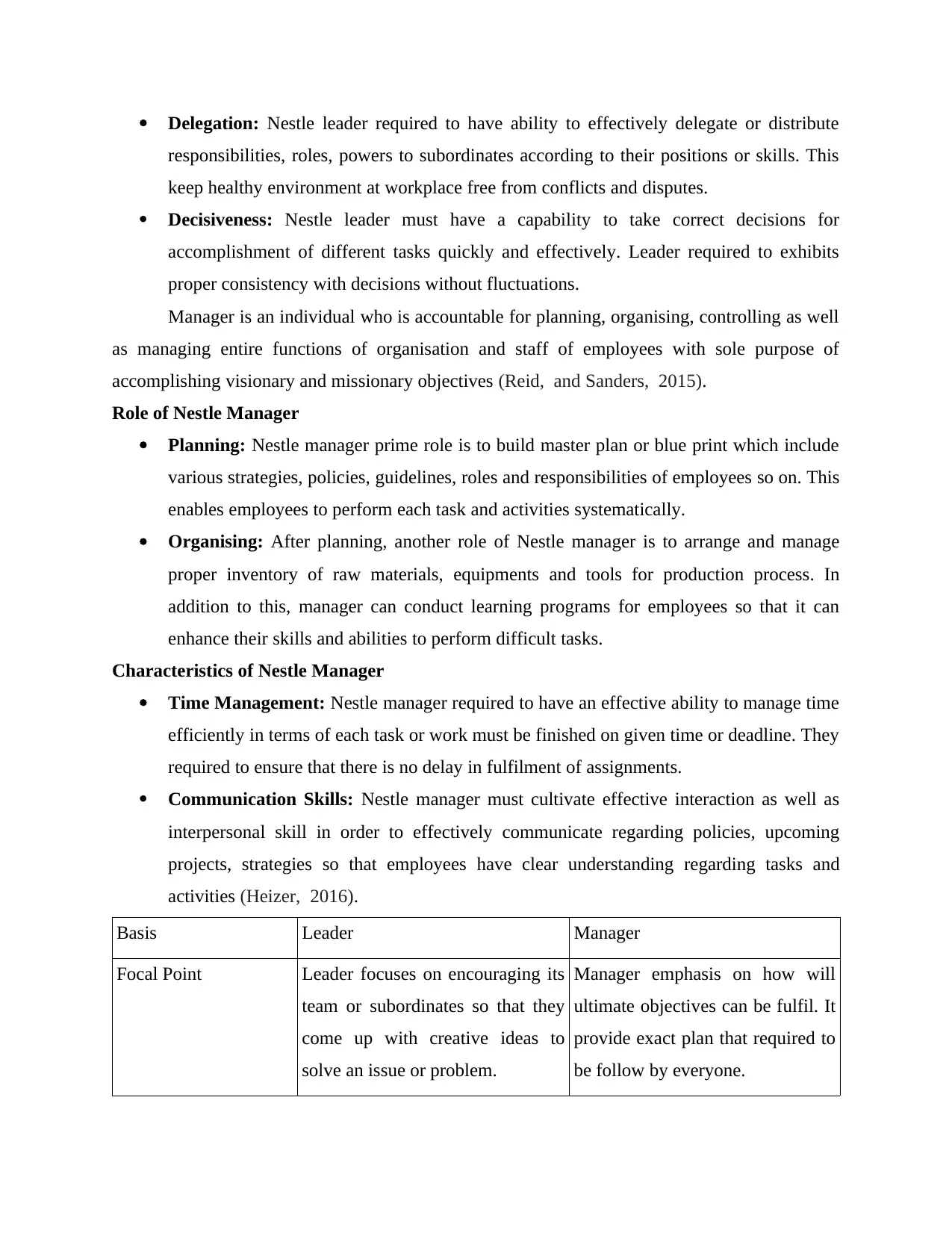
Delegation: Nestle leader required to have ability to effectively delegate or distribute
responsibilities, roles, powers to subordinates according to their positions or skills. This
keep healthy environment at workplace free from conflicts and disputes.
Decisiveness: Nestle leader must have a capability to take correct decisions for
accomplishment of different tasks quickly and effectively. Leader required to exhibits
proper consistency with decisions without fluctuations.
Manager is an individual who is accountable for planning, organising, controlling as well
as managing entire functions of organisation and staff of employees with sole purpose of
accomplishing visionary and missionary objectives (Reid, and Sanders, 2015).
Role of Nestle Manager
Planning: Nestle manager prime role is to build master plan or blue print which include
various strategies, policies, guidelines, roles and responsibilities of employees so on. This
enables employees to perform each task and activities systematically.
Organising: After planning, another role of Nestle manager is to arrange and manage
proper inventory of raw materials, equipments and tools for production process. In
addition to this, manager can conduct learning programs for employees so that it can
enhance their skills and abilities to perform difficult tasks.
Characteristics of Nestle Manager
Time Management: Nestle manager required to have an effective ability to manage time
efficiently in terms of each task or work must be finished on given time or deadline. They
required to ensure that there is no delay in fulfilment of assignments.
Communication Skills: Nestle manager must cultivate effective interaction as well as
interpersonal skill in order to effectively communicate regarding policies, upcoming
projects, strategies so that employees have clear understanding regarding tasks and
activities (Heizer, 2016).
Basis Leader Manager
Focal Point Leader focuses on encouraging its
team or subordinates so that they
come up with creative ideas to
solve an issue or problem.
Manager emphasis on how will
ultimate objectives can be fulfil. It
provide exact plan that required to
be follow by everyone.
responsibilities, roles, powers to subordinates according to their positions or skills. This
keep healthy environment at workplace free from conflicts and disputes.
Decisiveness: Nestle leader must have a capability to take correct decisions for
accomplishment of different tasks quickly and effectively. Leader required to exhibits
proper consistency with decisions without fluctuations.
Manager is an individual who is accountable for planning, organising, controlling as well
as managing entire functions of organisation and staff of employees with sole purpose of
accomplishing visionary and missionary objectives (Reid, and Sanders, 2015).
Role of Nestle Manager
Planning: Nestle manager prime role is to build master plan or blue print which include
various strategies, policies, guidelines, roles and responsibilities of employees so on. This
enables employees to perform each task and activities systematically.
Organising: After planning, another role of Nestle manager is to arrange and manage
proper inventory of raw materials, equipments and tools for production process. In
addition to this, manager can conduct learning programs for employees so that it can
enhance their skills and abilities to perform difficult tasks.
Characteristics of Nestle Manager
Time Management: Nestle manager required to have an effective ability to manage time
efficiently in terms of each task or work must be finished on given time or deadline. They
required to ensure that there is no delay in fulfilment of assignments.
Communication Skills: Nestle manager must cultivate effective interaction as well as
interpersonal skill in order to effectively communicate regarding policies, upcoming
projects, strategies so that employees have clear understanding regarding tasks and
activities (Heizer, 2016).
Basis Leader Manager
Focal Point Leader focuses on encouraging its
team or subordinates so that they
come up with creative ideas to
solve an issue or problem.
Manager emphasis on how will
ultimate objectives can be fulfil. It
provide exact plan that required to
be follow by everyone.
Paraphrase This Document
Need a fresh take? Get an instant paraphrase of this document with our AI Paraphraser

Dependence Leader follow various principles
and guidelines to lead its
followers.
Manager formulate its plan
according to pre defined policies
and procedures.
TASK 2
P2 Role of Leader and Function of manager in different situations.
Organisation operates and run its business operations in full of contingency and dynamic
environment. There are various internal and external forces which create a challenging business
situations and conditions that affects overall performance of employees and organisation. It is
leaders and managers duty and accountability to handle these problems effectively and
efficiently (Saucedo-Martínez, and et. al., 2018). Nestle is one of largest food processing
organisation which faces different business situations everyday. In such conditions, leaders and
managers are required to implement effective strategies to solve the same. This can be
understood by given situations.
New technology: Nestle is known for its quality food products and enjoys large market
share as well as customer base. Due to technological factor, new techniques and methods
emerge at fast pace so to compete with environmental changes. Company is planning for
introducing advance production techniques in terms of equipments and tools. Leaders
and managers are facing reluctant behaviour of workforce as they are not ready to adopt
new technology.
Role of Leader: in such situation, leader can make use of reward based activities in order
to motivate and stimulate inner urge of employees to perform operational activities with new
technology. Also, they can provide information regarding benefits associated with same to
workforces such as less time consuming, improvise their level of productivity etc.
Function of manager: in such circumstance, prime function of manager is to plan what
type of equipments, machineries, tools are required for production. Also, they required to plan
out various safety measures for workers (Song and Parola, 2015). Managers can organise
training period for purpose of improvising knowledge and skills of workers so that they can
easily understand technical changes as soon as possible.
and guidelines to lead its
followers.
Manager formulate its plan
according to pre defined policies
and procedures.
TASK 2
P2 Role of Leader and Function of manager in different situations.
Organisation operates and run its business operations in full of contingency and dynamic
environment. There are various internal and external forces which create a challenging business
situations and conditions that affects overall performance of employees and organisation. It is
leaders and managers duty and accountability to handle these problems effectively and
efficiently (Saucedo-Martínez, and et. al., 2018). Nestle is one of largest food processing
organisation which faces different business situations everyday. In such conditions, leaders and
managers are required to implement effective strategies to solve the same. This can be
understood by given situations.
New technology: Nestle is known for its quality food products and enjoys large market
share as well as customer base. Due to technological factor, new techniques and methods
emerge at fast pace so to compete with environmental changes. Company is planning for
introducing advance production techniques in terms of equipments and tools. Leaders
and managers are facing reluctant behaviour of workforce as they are not ready to adopt
new technology.
Role of Leader: in such situation, leader can make use of reward based activities in order
to motivate and stimulate inner urge of employees to perform operational activities with new
technology. Also, they can provide information regarding benefits associated with same to
workforces such as less time consuming, improvise their level of productivity etc.
Function of manager: in such circumstance, prime function of manager is to plan what
type of equipments, machineries, tools are required for production. Also, they required to plan
out various safety measures for workers (Song and Parola, 2015). Managers can organise
training period for purpose of improvising knowledge and skills of workers so that they can
easily understand technical changes as soon as possible.
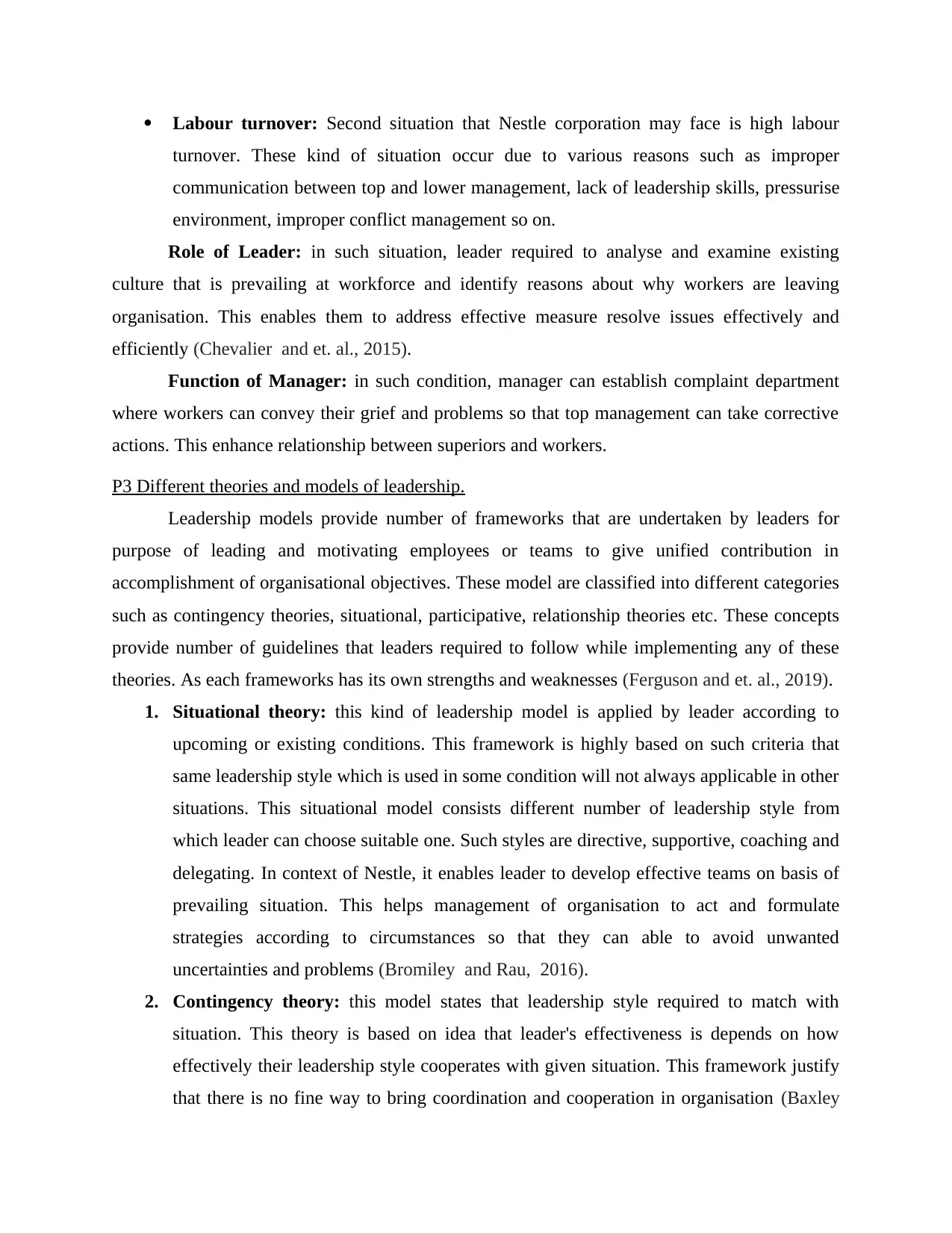
Labour turnover: Second situation that Nestle corporation may face is high labour
turnover. These kind of situation occur due to various reasons such as improper
communication between top and lower management, lack of leadership skills, pressurise
environment, improper conflict management so on.
Role of Leader: in such situation, leader required to analyse and examine existing
culture that is prevailing at workforce and identify reasons about why workers are leaving
organisation. This enables them to address effective measure resolve issues effectively and
efficiently (Chevalier and et. al., 2015).
Function of Manager: in such condition, manager can establish complaint department
where workers can convey their grief and problems so that top management can take corrective
actions. This enhance relationship between superiors and workers.
P3 Different theories and models of leadership.
Leadership models provide number of frameworks that are undertaken by leaders for
purpose of leading and motivating employees or teams to give unified contribution in
accomplishment of organisational objectives. These model are classified into different categories
such as contingency theories, situational, participative, relationship theories etc. These concepts
provide number of guidelines that leaders required to follow while implementing any of these
theories. As each frameworks has its own strengths and weaknesses (Ferguson and et. al., 2019).
1. Situational theory: this kind of leadership model is applied by leader according to
upcoming or existing conditions. This framework is highly based on such criteria that
same leadership style which is used in some condition will not always applicable in other
situations. This situational model consists different number of leadership style from
which leader can choose suitable one. Such styles are directive, supportive, coaching and
delegating. In context of Nestle, it enables leader to develop effective teams on basis of
prevailing situation. This helps management of organisation to act and formulate
strategies according to circumstances so that they can able to avoid unwanted
uncertainties and problems (Bromiley and Rau, 2016).
2. Contingency theory: this model states that leadership style required to match with
situation. This theory is based on idea that leader's effectiveness is depends on how
effectively their leadership style cooperates with given situation. This framework justify
that there is no fine way to bring coordination and cooperation in organisation (Baxley
turnover. These kind of situation occur due to various reasons such as improper
communication between top and lower management, lack of leadership skills, pressurise
environment, improper conflict management so on.
Role of Leader: in such situation, leader required to analyse and examine existing
culture that is prevailing at workforce and identify reasons about why workers are leaving
organisation. This enables them to address effective measure resolve issues effectively and
efficiently (Chevalier and et. al., 2015).
Function of Manager: in such condition, manager can establish complaint department
where workers can convey their grief and problems so that top management can take corrective
actions. This enhance relationship between superiors and workers.
P3 Different theories and models of leadership.
Leadership models provide number of frameworks that are undertaken by leaders for
purpose of leading and motivating employees or teams to give unified contribution in
accomplishment of organisational objectives. These model are classified into different categories
such as contingency theories, situational, participative, relationship theories etc. These concepts
provide number of guidelines that leaders required to follow while implementing any of these
theories. As each frameworks has its own strengths and weaknesses (Ferguson and et. al., 2019).
1. Situational theory: this kind of leadership model is applied by leader according to
upcoming or existing conditions. This framework is highly based on such criteria that
same leadership style which is used in some condition will not always applicable in other
situations. This situational model consists different number of leadership style from
which leader can choose suitable one. Such styles are directive, supportive, coaching and
delegating. In context of Nestle, it enables leader to develop effective teams on basis of
prevailing situation. This helps management of organisation to act and formulate
strategies according to circumstances so that they can able to avoid unwanted
uncertainties and problems (Bromiley and Rau, 2016).
2. Contingency theory: this model states that leadership style required to match with
situation. This theory is based on idea that leader's effectiveness is depends on how
effectively their leadership style cooperates with given situation. This framework justify
that there is no fine way to bring coordination and cooperation in organisation (Baxley
⊘ This is a preview!⊘
Do you want full access?
Subscribe today to unlock all pages.

Trusted by 1+ million students worldwide
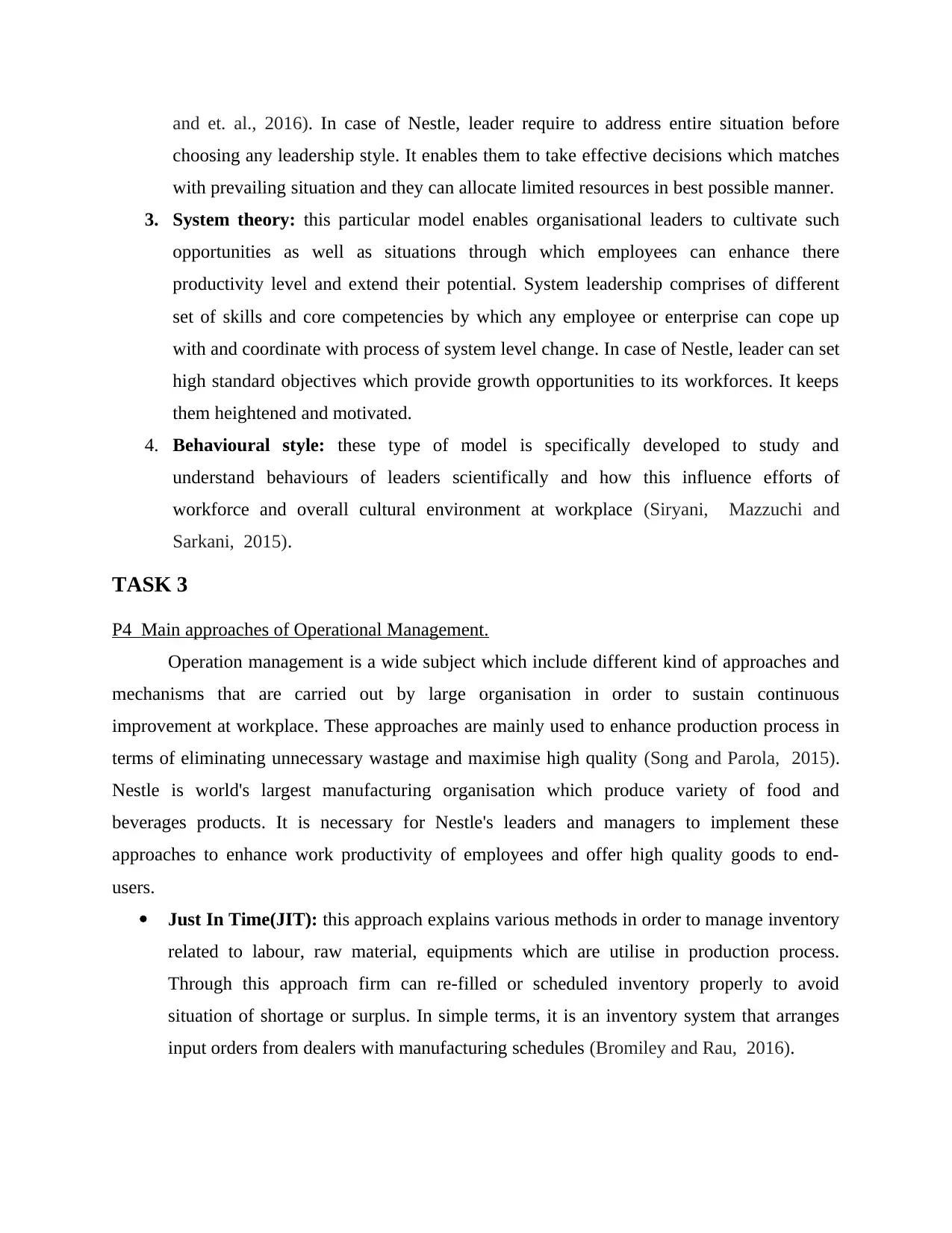
and et. al., 2016). In case of Nestle, leader require to address entire situation before
choosing any leadership style. It enables them to take effective decisions which matches
with prevailing situation and they can allocate limited resources in best possible manner.
3. System theory: this particular model enables organisational leaders to cultivate such
opportunities as well as situations through which employees can enhance there
productivity level and extend their potential. System leadership comprises of different
set of skills and core competencies by which any employee or enterprise can cope up
with and coordinate with process of system level change. In case of Nestle, leader can set
high standard objectives which provide growth opportunities to its workforces. It keeps
them heightened and motivated.
4. Behavioural style: these type of model is specifically developed to study and
understand behaviours of leaders scientifically and how this influence efforts of
workforce and overall cultural environment at workplace (Siryani, Mazzuchi and
Sarkani, 2015).
TASK 3
P4 Main approaches of Operational Management.
Operation management is a wide subject which include different kind of approaches and
mechanisms that are carried out by large organisation in order to sustain continuous
improvement at workplace. These approaches are mainly used to enhance production process in
terms of eliminating unnecessary wastage and maximise high quality (Song and Parola, 2015).
Nestle is world's largest manufacturing organisation which produce variety of food and
beverages products. It is necessary for Nestle's leaders and managers to implement these
approaches to enhance work productivity of employees and offer high quality goods to end-
users.
Just In Time(JIT): this approach explains various methods in order to manage inventory
related to labour, raw material, equipments which are utilise in production process.
Through this approach firm can re-filled or scheduled inventory properly to avoid
situation of shortage or surplus. In simple terms, it is an inventory system that arranges
input orders from dealers with manufacturing schedules (Bromiley and Rau, 2016).
choosing any leadership style. It enables them to take effective decisions which matches
with prevailing situation and they can allocate limited resources in best possible manner.
3. System theory: this particular model enables organisational leaders to cultivate such
opportunities as well as situations through which employees can enhance there
productivity level and extend their potential. System leadership comprises of different
set of skills and core competencies by which any employee or enterprise can cope up
with and coordinate with process of system level change. In case of Nestle, leader can set
high standard objectives which provide growth opportunities to its workforces. It keeps
them heightened and motivated.
4. Behavioural style: these type of model is specifically developed to study and
understand behaviours of leaders scientifically and how this influence efforts of
workforce and overall cultural environment at workplace (Siryani, Mazzuchi and
Sarkani, 2015).
TASK 3
P4 Main approaches of Operational Management.
Operation management is a wide subject which include different kind of approaches and
mechanisms that are carried out by large organisation in order to sustain continuous
improvement at workplace. These approaches are mainly used to enhance production process in
terms of eliminating unnecessary wastage and maximise high quality (Song and Parola, 2015).
Nestle is world's largest manufacturing organisation which produce variety of food and
beverages products. It is necessary for Nestle's leaders and managers to implement these
approaches to enhance work productivity of employees and offer high quality goods to end-
users.
Just In Time(JIT): this approach explains various methods in order to manage inventory
related to labour, raw material, equipments which are utilise in production process.
Through this approach firm can re-filled or scheduled inventory properly to avoid
situation of shortage or surplus. In simple terms, it is an inventory system that arranges
input orders from dealers with manufacturing schedules (Bromiley and Rau, 2016).
Paraphrase This Document
Need a fresh take? Get an instant paraphrase of this document with our AI Paraphraser
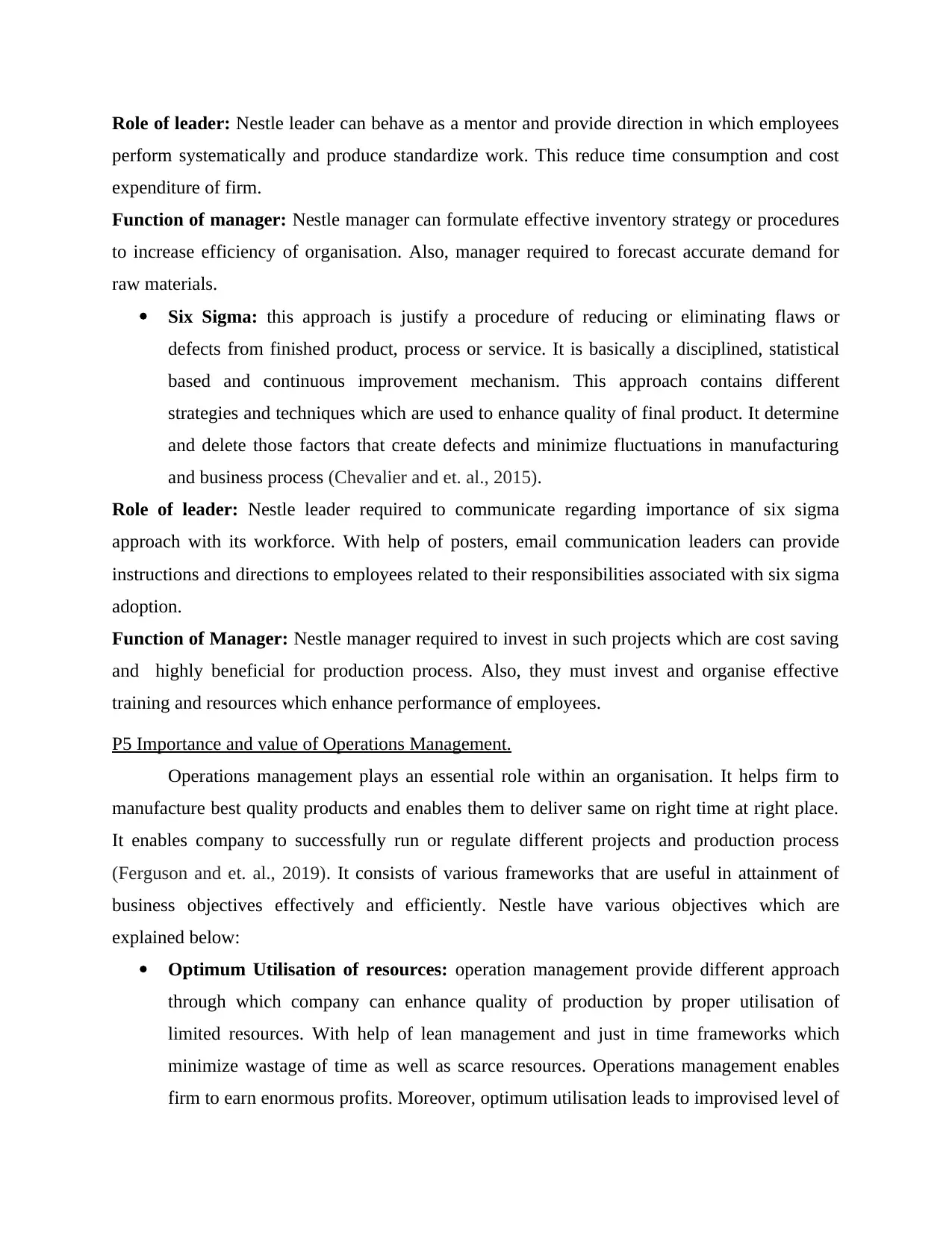
Role of leader: Nestle leader can behave as a mentor and provide direction in which employees
perform systematically and produce standardize work. This reduce time consumption and cost
expenditure of firm.
Function of manager: Nestle manager can formulate effective inventory strategy or procedures
to increase efficiency of organisation. Also, manager required to forecast accurate demand for
raw materials.
Six Sigma: this approach is justify a procedure of reducing or eliminating flaws or
defects from finished product, process or service. It is basically a disciplined, statistical
based and continuous improvement mechanism. This approach contains different
strategies and techniques which are used to enhance quality of final product. It determine
and delete those factors that create defects and minimize fluctuations in manufacturing
and business process (Chevalier and et. al., 2015).
Role of leader: Nestle leader required to communicate regarding importance of six sigma
approach with its workforce. With help of posters, email communication leaders can provide
instructions and directions to employees related to their responsibilities associated with six sigma
adoption.
Function of Manager: Nestle manager required to invest in such projects which are cost saving
and highly beneficial for production process. Also, they must invest and organise effective
training and resources which enhance performance of employees.
P5 Importance and value of Operations Management.
Operations management plays an essential role within an organisation. It helps firm to
manufacture best quality products and enables them to deliver same on right time at right place.
It enables company to successfully run or regulate different projects and production process
(Ferguson and et. al., 2019). It consists of various frameworks that are useful in attainment of
business objectives effectively and efficiently. Nestle have various objectives which are
explained below:
Optimum Utilisation of resources: operation management provide different approach
through which company can enhance quality of production by proper utilisation of
limited resources. With help of lean management and just in time frameworks which
minimize wastage of time as well as scarce resources. Operations management enables
firm to earn enormous profits. Moreover, optimum utilisation leads to improvised level of
perform systematically and produce standardize work. This reduce time consumption and cost
expenditure of firm.
Function of manager: Nestle manager can formulate effective inventory strategy or procedures
to increase efficiency of organisation. Also, manager required to forecast accurate demand for
raw materials.
Six Sigma: this approach is justify a procedure of reducing or eliminating flaws or
defects from finished product, process or service. It is basically a disciplined, statistical
based and continuous improvement mechanism. This approach contains different
strategies and techniques which are used to enhance quality of final product. It determine
and delete those factors that create defects and minimize fluctuations in manufacturing
and business process (Chevalier and et. al., 2015).
Role of leader: Nestle leader required to communicate regarding importance of six sigma
approach with its workforce. With help of posters, email communication leaders can provide
instructions and directions to employees related to their responsibilities associated with six sigma
adoption.
Function of Manager: Nestle manager required to invest in such projects which are cost saving
and highly beneficial for production process. Also, they must invest and organise effective
training and resources which enhance performance of employees.
P5 Importance and value of Operations Management.
Operations management plays an essential role within an organisation. It helps firm to
manufacture best quality products and enables them to deliver same on right time at right place.
It enables company to successfully run or regulate different projects and production process
(Ferguson and et. al., 2019). It consists of various frameworks that are useful in attainment of
business objectives effectively and efficiently. Nestle have various objectives which are
explained below:
Optimum Utilisation of resources: operation management provide different approach
through which company can enhance quality of production by proper utilisation of
limited resources. With help of lean management and just in time frameworks which
minimize wastage of time as well as scarce resources. Operations management enables
firm to earn enormous profits. Moreover, optimum utilisation leads to improvised level of
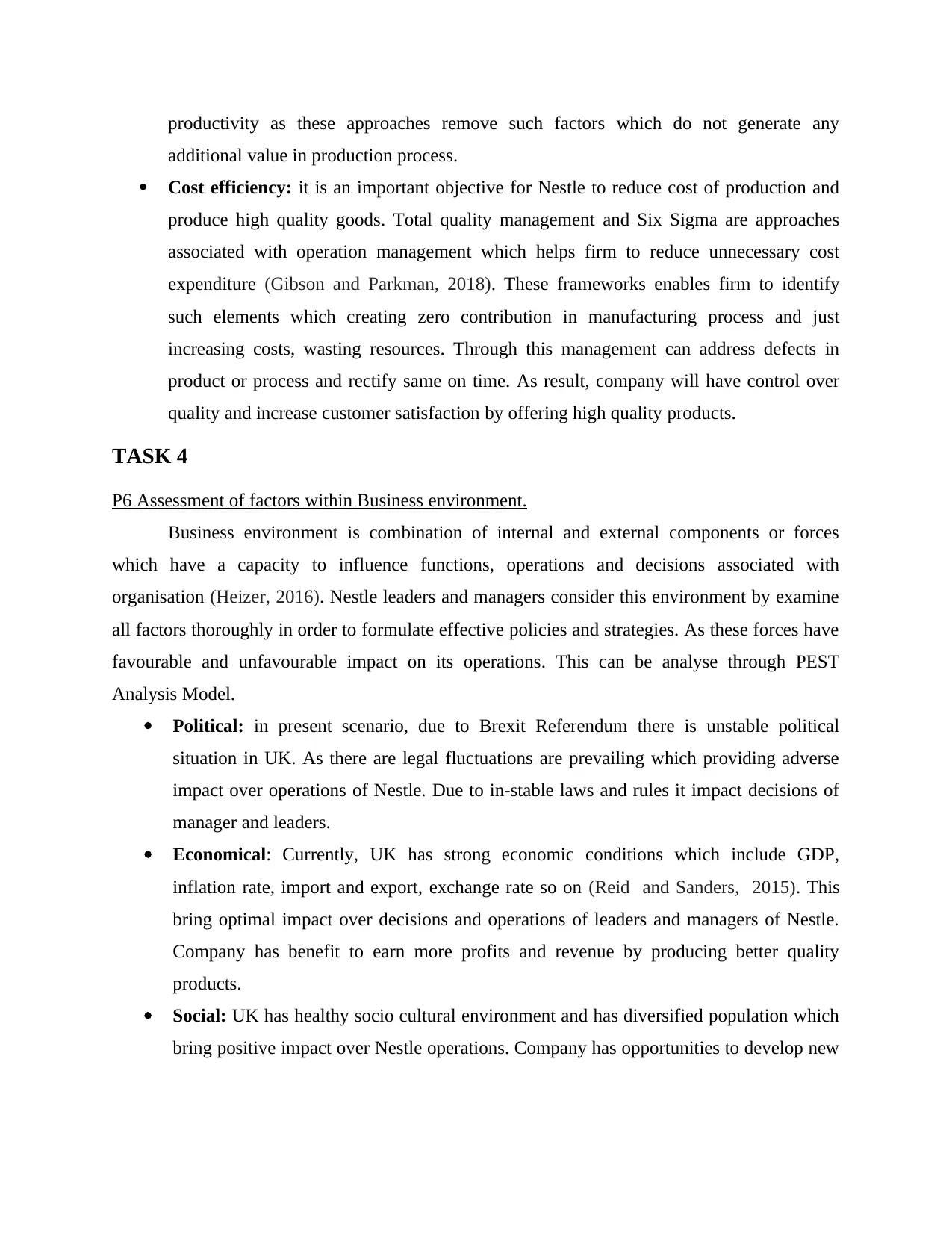
productivity as these approaches remove such factors which do not generate any
additional value in production process.
Cost efficiency: it is an important objective for Nestle to reduce cost of production and
produce high quality goods. Total quality management and Six Sigma are approaches
associated with operation management which helps firm to reduce unnecessary cost
expenditure (Gibson and Parkman, 2018). These frameworks enables firm to identify
such elements which creating zero contribution in manufacturing process and just
increasing costs, wasting resources. Through this management can address defects in
product or process and rectify same on time. As result, company will have control over
quality and increase customer satisfaction by offering high quality products.
TASK 4
P6 Assessment of factors within Business environment.
Business environment is combination of internal and external components or forces
which have a capacity to influence functions, operations and decisions associated with
organisation (Heizer, 2016). Nestle leaders and managers consider this environment by examine
all factors thoroughly in order to formulate effective policies and strategies. As these forces have
favourable and unfavourable impact on its operations. This can be analyse through PEST
Analysis Model.
Political: in present scenario, due to Brexit Referendum there is unstable political
situation in UK. As there are legal fluctuations are prevailing which providing adverse
impact over operations of Nestle. Due to in-stable laws and rules it impact decisions of
manager and leaders.
Economical: Currently, UK has strong economic conditions which include GDP,
inflation rate, import and export, exchange rate so on (Reid and Sanders, 2015). This
bring optimal impact over decisions and operations of leaders and managers of Nestle.
Company has benefit to earn more profits and revenue by producing better quality
products.
Social: UK has healthy socio cultural environment and has diversified population which
bring positive impact over Nestle operations. Company has opportunities to develop new
additional value in production process.
Cost efficiency: it is an important objective for Nestle to reduce cost of production and
produce high quality goods. Total quality management and Six Sigma are approaches
associated with operation management which helps firm to reduce unnecessary cost
expenditure (Gibson and Parkman, 2018). These frameworks enables firm to identify
such elements which creating zero contribution in manufacturing process and just
increasing costs, wasting resources. Through this management can address defects in
product or process and rectify same on time. As result, company will have control over
quality and increase customer satisfaction by offering high quality products.
TASK 4
P6 Assessment of factors within Business environment.
Business environment is combination of internal and external components or forces
which have a capacity to influence functions, operations and decisions associated with
organisation (Heizer, 2016). Nestle leaders and managers consider this environment by examine
all factors thoroughly in order to formulate effective policies and strategies. As these forces have
favourable and unfavourable impact on its operations. This can be analyse through PEST
Analysis Model.
Political: in present scenario, due to Brexit Referendum there is unstable political
situation in UK. As there are legal fluctuations are prevailing which providing adverse
impact over operations of Nestle. Due to in-stable laws and rules it impact decisions of
manager and leaders.
Economical: Currently, UK has strong economic conditions which include GDP,
inflation rate, import and export, exchange rate so on (Reid and Sanders, 2015). This
bring optimal impact over decisions and operations of leaders and managers of Nestle.
Company has benefit to earn more profits and revenue by producing better quality
products.
Social: UK has healthy socio cultural environment and has diversified population which
bring positive impact over Nestle operations. Company has opportunities to develop new
⊘ This is a preview!⊘
Do you want full access?
Subscribe today to unlock all pages.

Trusted by 1+ million students worldwide
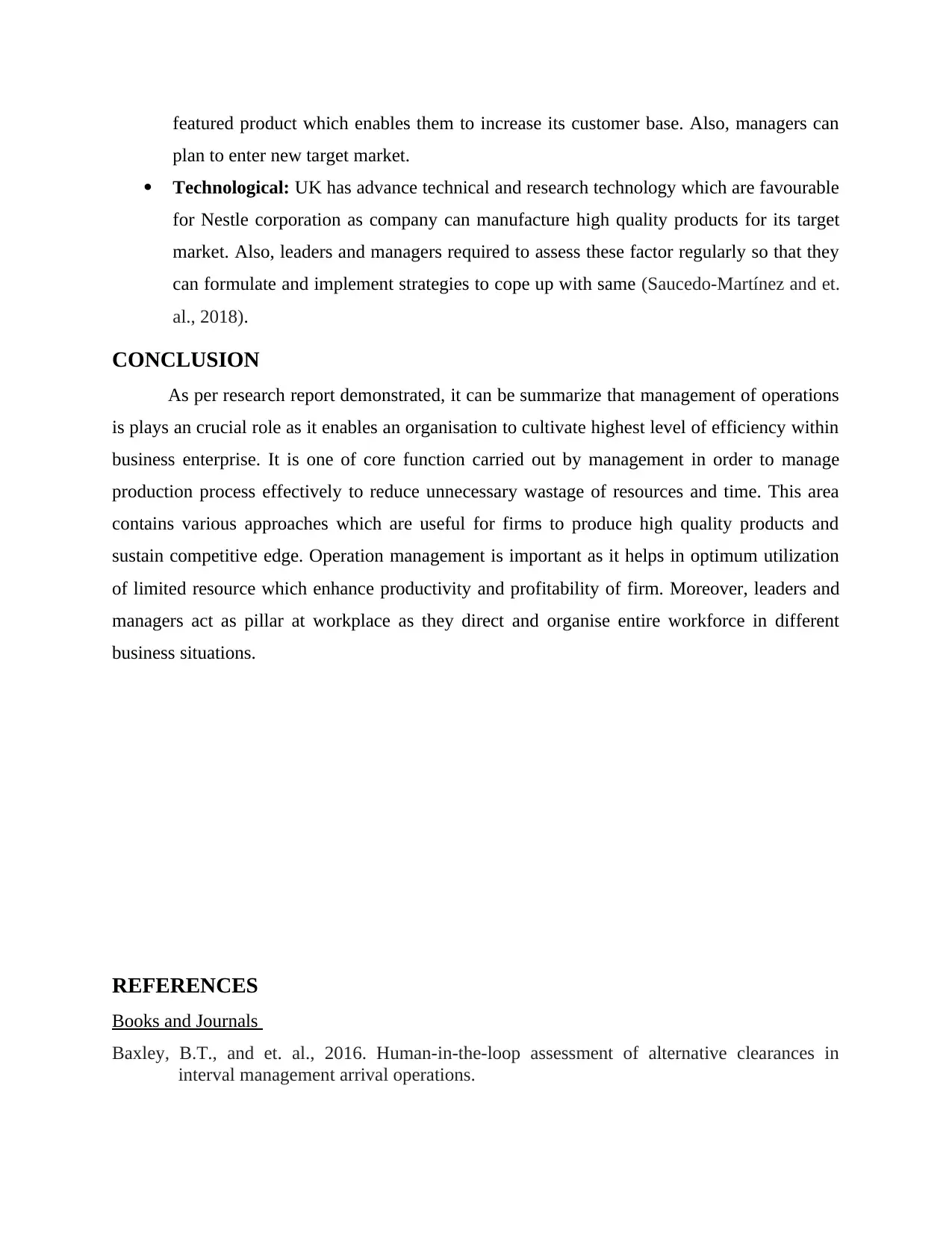
featured product which enables them to increase its customer base. Also, managers can
plan to enter new target market.
Technological: UK has advance technical and research technology which are favourable
for Nestle corporation as company can manufacture high quality products for its target
market. Also, leaders and managers required to assess these factor regularly so that they
can formulate and implement strategies to cope up with same (Saucedo-Martínez and et.
al., 2018).
CONCLUSION
As per research report demonstrated, it can be summarize that management of operations
is plays an crucial role as it enables an organisation to cultivate highest level of efficiency within
business enterprise. It is one of core function carried out by management in order to manage
production process effectively to reduce unnecessary wastage of resources and time. This area
contains various approaches which are useful for firms to produce high quality products and
sustain competitive edge. Operation management is important as it helps in optimum utilization
of limited resource which enhance productivity and profitability of firm. Moreover, leaders and
managers act as pillar at workplace as they direct and organise entire workforce in different
business situations.
REFERENCES
Books and Journals
Baxley, B.T., and et. al., 2016. Human-in-the-loop assessment of alternative clearances in
interval management arrival operations.
plan to enter new target market.
Technological: UK has advance technical and research technology which are favourable
for Nestle corporation as company can manufacture high quality products for its target
market. Also, leaders and managers required to assess these factor regularly so that they
can formulate and implement strategies to cope up with same (Saucedo-Martínez and et.
al., 2018).
CONCLUSION
As per research report demonstrated, it can be summarize that management of operations
is plays an crucial role as it enables an organisation to cultivate highest level of efficiency within
business enterprise. It is one of core function carried out by management in order to manage
production process effectively to reduce unnecessary wastage of resources and time. This area
contains various approaches which are useful for firms to produce high quality products and
sustain competitive edge. Operation management is important as it helps in optimum utilization
of limited resource which enhance productivity and profitability of firm. Moreover, leaders and
managers act as pillar at workplace as they direct and organise entire workforce in different
business situations.
REFERENCES
Books and Journals
Baxley, B.T., and et. al., 2016. Human-in-the-loop assessment of alternative clearances in
interval management arrival operations.
Paraphrase This Document
Need a fresh take? Get an instant paraphrase of this document with our AI Paraphraser
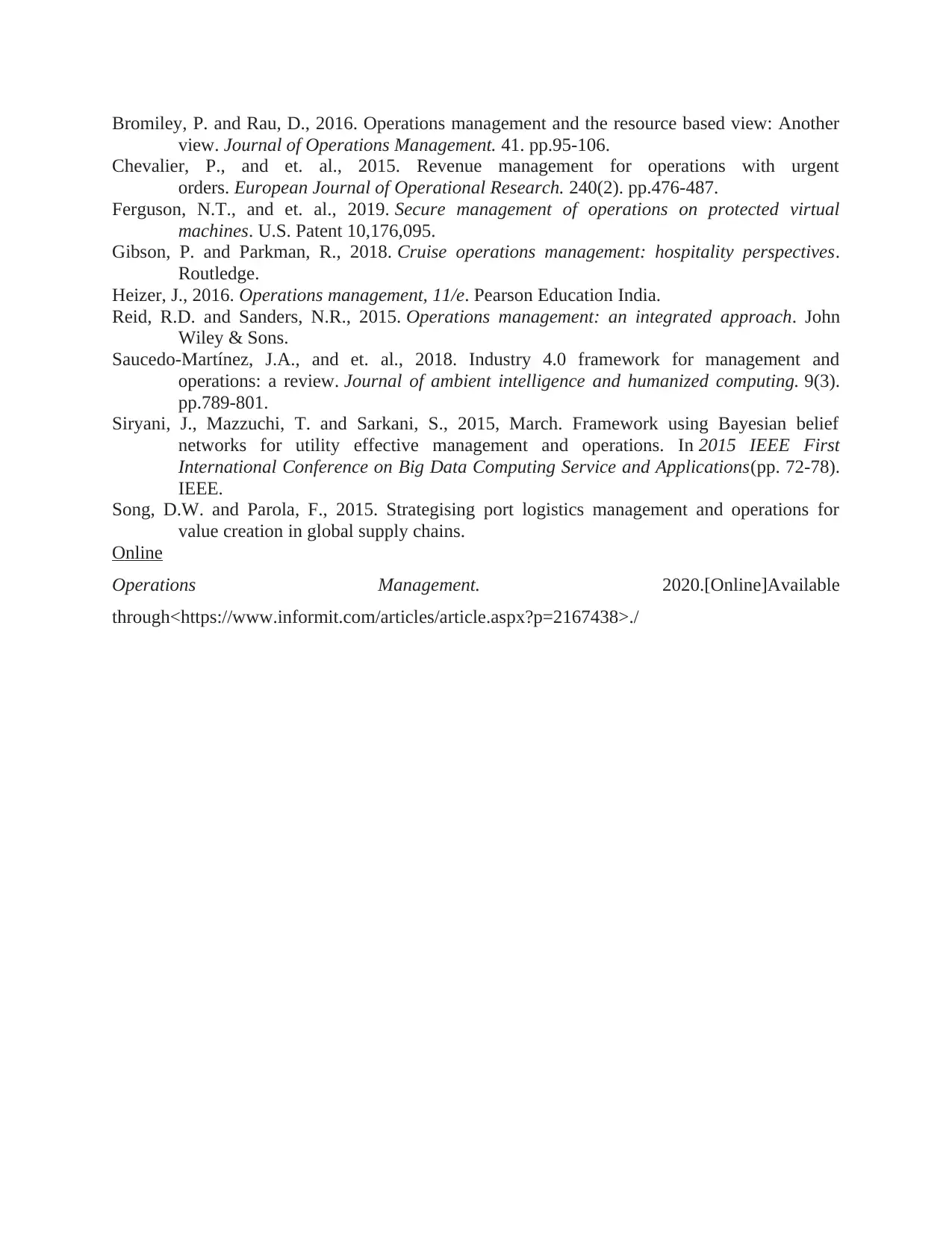
Bromiley, P. and Rau, D., 2016. Operations management and the resource based view: Another
view. Journal of Operations Management. 41. pp.95-106.
Chevalier, P., and et. al., 2015. Revenue management for operations with urgent
orders. European Journal of Operational Research. 240(2). pp.476-487.
Ferguson, N.T., and et. al., 2019. Secure management of operations on protected virtual
machines. U.S. Patent 10,176,095.
Gibson, P. and Parkman, R., 2018. Cruise operations management: hospitality perspectives.
Routledge.
Heizer, J., 2016. Operations management, 11/e. Pearson Education India.
Reid, R.D. and Sanders, N.R., 2015. Operations management: an integrated approach. John
Wiley & Sons.
Saucedo-Martínez, J.A., and et. al., 2018. Industry 4.0 framework for management and
operations: a review. Journal of ambient intelligence and humanized computing. 9(3).
pp.789-801.
Siryani, J., Mazzuchi, T. and Sarkani, S., 2015, March. Framework using Bayesian belief
networks for utility effective management and operations. In 2015 IEEE First
International Conference on Big Data Computing Service and Applications(pp. 72-78).
IEEE.
Song, D.W. and Parola, F., 2015. Strategising port logistics management and operations for
value creation in global supply chains.
Online
Operations Management. 2020.[Online]Available
through<https://www.informit.com/articles/article.aspx?p=2167438>./
view. Journal of Operations Management. 41. pp.95-106.
Chevalier, P., and et. al., 2015. Revenue management for operations with urgent
orders. European Journal of Operational Research. 240(2). pp.476-487.
Ferguson, N.T., and et. al., 2019. Secure management of operations on protected virtual
machines. U.S. Patent 10,176,095.
Gibson, P. and Parkman, R., 2018. Cruise operations management: hospitality perspectives.
Routledge.
Heizer, J., 2016. Operations management, 11/e. Pearson Education India.
Reid, R.D. and Sanders, N.R., 2015. Operations management: an integrated approach. John
Wiley & Sons.
Saucedo-Martínez, J.A., and et. al., 2018. Industry 4.0 framework for management and
operations: a review. Journal of ambient intelligence and humanized computing. 9(3).
pp.789-801.
Siryani, J., Mazzuchi, T. and Sarkani, S., 2015, March. Framework using Bayesian belief
networks for utility effective management and operations. In 2015 IEEE First
International Conference on Big Data Computing Service and Applications(pp. 72-78).
IEEE.
Song, D.W. and Parola, F., 2015. Strategising port logistics management and operations for
value creation in global supply chains.
Online
Operations Management. 2020.[Online]Available
through<https://www.informit.com/articles/article.aspx?p=2167438>./
1 out of 11
Related Documents
Your All-in-One AI-Powered Toolkit for Academic Success.
+13062052269
info@desklib.com
Available 24*7 on WhatsApp / Email
![[object Object]](/_next/static/media/star-bottom.7253800d.svg)
Unlock your academic potential
Copyright © 2020–2026 A2Z Services. All Rights Reserved. Developed and managed by ZUCOL.




